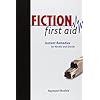Today, I'm participating in DL Hammmons's Deja Vu Blogfest, in which we share a post from the previous year that we feel got less attention than we'd like. My recycled post is from January.
----
As a writer, should you be especially careful about what you read?
It's a question that's been plaguing me during a reading binge. My current read isn't an identical scenario to the one I'm currently writing, but there are numerous points of intersection. This puts me in a bit of a quandary. Will continuing to read help me work out my own story, or will it derail me?
In her nonfiction book on writing, Escaping into the Open, Elizabeth Berg makes an interesting assertion about influence I've never seen anywhere else:
"While drafting, avoid reading books on the same topic as yours."
Her reasoning? "...no matter how aware or sophisticated or experienced you are, no matter how determined to write your own story, there's a very real danger that you will start to copy. It may be unconscious, but it can happen. And if that happens, it's a shame...because it denies the reading public the pleasure of your originality."
Part of me disagrees. If I don't know how others have tackled this topic, how do I know if my ideas are original? How do I avoid just repeating what has been said before if I'm ignorant of it? How do I not end up leaning on tired clichés? Berg seems to argue here that clichés crop up because you read others' takes on your topic. You can't help but copy.
The funny thing is, I could argue the opposite. Knowing how others have treated a topic might constrain me to try too hard to take a new direction in order to seem original. In so doing, I risk creating an inauthentic experience with inauthentic emotion.
But either way, the conclusion would be stop reading that similar book.
But other possible good lessons could come from continuing. I can have distance from another's story I can't yet have from my own. I can more easily sense the kinds of details I might include as a writer that as a reader I find superfluous or boring.
Similarly, this other author could open my eyes to dramatic possibilities I'm not yet exploring in my work: places where conflict might erupt or alliances could form; ways of delivering, delaying, or withholding information. Berg would likely say I should learn these latter lessons from books on topics quite different from mine.
What do you think? Is it a help or a danger to read books on a similar topic?
----
Anxiety of Influence
As a writer, should you be especially careful about what you read?
It's a question that's been plaguing me during a reading binge. My current read isn't an identical scenario to the one I'm currently writing, but there are numerous points of intersection. This puts me in a bit of a quandary. Will continuing to read help me work out my own story, or will it derail me?
| Photo credit: dave from morguefile.com |
"While drafting, avoid reading books on the same topic as yours."
Her reasoning? "...no matter how aware or sophisticated or experienced you are, no matter how determined to write your own story, there's a very real danger that you will start to copy. It may be unconscious, but it can happen. And if that happens, it's a shame...because it denies the reading public the pleasure of your originality."
Part of me disagrees. If I don't know how others have tackled this topic, how do I know if my ideas are original? How do I avoid just repeating what has been said before if I'm ignorant of it? How do I not end up leaning on tired clichés? Berg seems to argue here that clichés crop up because you read others' takes on your topic. You can't help but copy.
The funny thing is, I could argue the opposite. Knowing how others have treated a topic might constrain me to try too hard to take a new direction in order to seem original. In so doing, I risk creating an inauthentic experience with inauthentic emotion.
But either way, the conclusion would be stop reading that similar book.
But other possible good lessons could come from continuing. I can have distance from another's story I can't yet have from my own. I can more easily sense the kinds of details I might include as a writer that as a reader I find superfluous or boring.
Similarly, this other author could open my eyes to dramatic possibilities I'm not yet exploring in my work: places where conflict might erupt or alliances could form; ways of delivering, delaying, or withholding information. Berg would likely say I should learn these latter lessons from books on topics quite different from mine.
What do you think? Is it a help or a danger to read books on a similar topic?


































